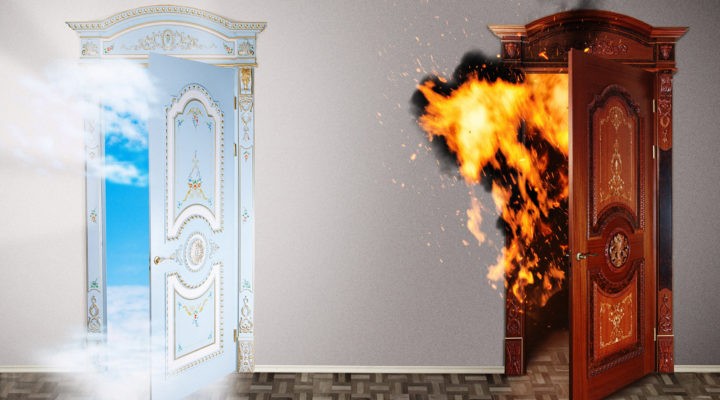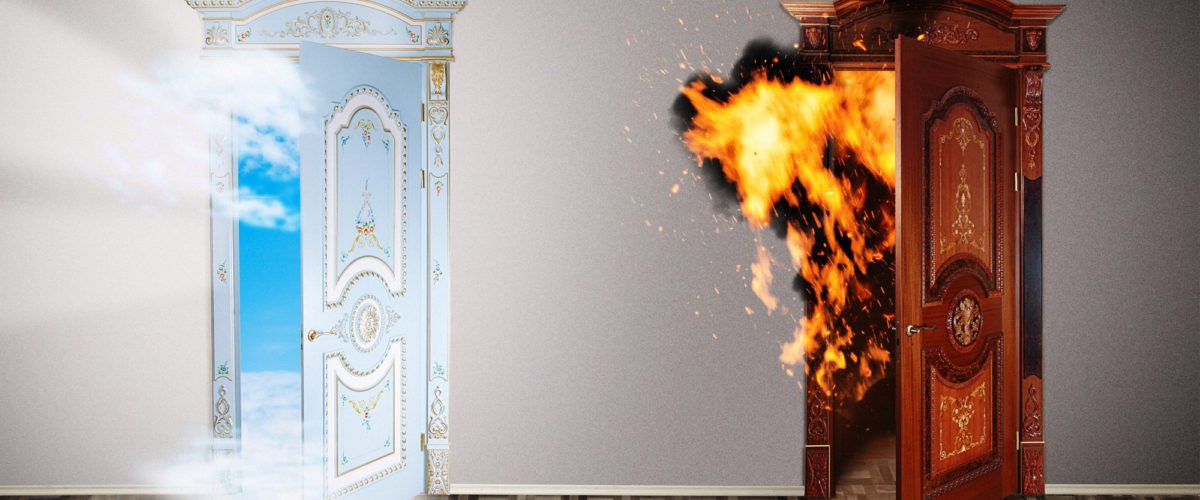New research on American beliefs about some of faith’s hardest questions highlights both the nation’s biblical illiteracy and the chasm between what various Christian traditions teach. And it holds a few surprises about how people in the pew actually believe things contrary to their own church’s doctrine.
Pew Research in September dug into Americans’ views on theodicy (why do bad things happen to good people?), as well as their views on the reality of heaven and hell and how one gets to either destination.
While most of the questions produced clear majority views within the American populace, the detailed analysis among various iterations of Christianity reveals deep differences. And it turns out that the majority view on some questions may part ways with orthodox Christian teaching.
For example, 33% of American adults — including 30% of those who identify as Christian — believe in reincarnation. No major branch of Christianity teaches reincarnation, which also has no support in the biblical text.
While belief in reincarnation is not a majority view in American life, it does represent what Pew calls “a substantial minority.”
Those most likely to express belief in reincarnation are Black Protestants (48%) and Hispanic Catholics (47%). Overall, younger adults are more likely than older adults to believe in reincarnation.
Why bad things happen
The heart of the new study, however, probes views on why bad things happen in the world — a pertinent question in light of the current scourge of a global pandemic. The Pew research takes on this age-old question from various angles. The combined results show that Americans are deeply conflicted on these questions and sometimes hold seemingly contradictory views.
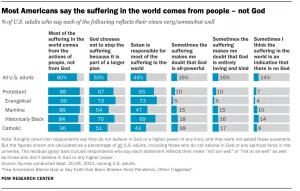 When asked which of four options best explains why suffering exists, a plurality (44%) chose “sometimes bad things just happen,” while 22% chose “suffering is mostly a consequence of people’s own actions,” 19% chose “suffering is mostly a result of the way society is structured” and 19% chose “to provide an opportunity for people to come out stronger.”
When asked which of four options best explains why suffering exists, a plurality (44%) chose “sometimes bad things just happen,” while 22% chose “suffering is mostly a consequence of people’s own actions,” 19% chose “suffering is mostly a result of the way society is structured” and 19% chose “to provide an opportunity for people to come out stronger.”
Yet asked separately what they see as the source of most suffering in the world, 80% of Americans identified “the actions of people” rather than actions by God as the source. Evangelicals and Catholics are the most likely (both 90%) to say this.
In contrast, multiple other studies have found evangelical Christians among those least likely to believe in human action causing climate change or being responsible for systemic racism.
The Pew survey asked another question about personal and societal causes of suffering, revealing that Americans “somewhat” believe suffering is mostly caused by people’s own actions or is a result of the way society is structured. While there are a few variations among subgroups on these questions, the gaps are small. The only notable outlier is that Hispanic Catholics are nearly twice as likely as the general population to believe strongly that suffering is mainly a consequence of people’s own actions.
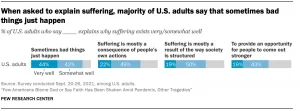 However, asked a different way, the percentage of Americans who strongly believe suffering comes from the actions of people and not from God doubles. This question gave three options for the source of suffering: people’s own actions, being part of a “larger plan” or being caused by Satan.
However, asked a different way, the percentage of Americans who strongly believe suffering comes from the actions of people and not from God doubles. This question gave three options for the source of suffering: people’s own actions, being part of a “larger plan” or being caused by Satan.
Evangelical Protestants are the most likely to assign blame for suffering to Satan (37%) followed by Black Protestants (34%).
Free will
One of the greatest theological differences among Protestant Christians today has been fueled by a resurgence of Calvinism — especially among conservative Baptists and evangelicals. Neo-Calvinists believe in predestination, including the idea that God not only has chosen in advance who will be saved but plays a heavy role in determining the path of human events.
A large majority of Americans (71%) told Pew they believe humans “are free to act in ways that go against the plans of God or a higher power,” while only 18% said God “directly influences everything that occurs in the world.”
There are few variations among Christian subgroups on this question, although evangelicals (22%) and Black Protestants (26%) are slightly more likely than others to say God directly influences everything.
In a surprising twist, young adults ages 18 to 29 (22%) are nearly twice as likely as older adults age 65 and above (14%) to see God directly influencing everything.
Thankful we’re not suffering
Among the things Americans may be giving thanks for around their holiday tables this year is that they are more fortunate than others they see suffering. The Pew research found that seeing or hearing news about the suffering of others often sparks not only sadness for those suffering (reported by 62%) but also thankfulness that the bad thing isn’t happening to them (reported by 71%).
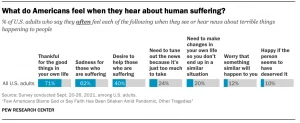 However, seeing the suffering of others is nearly twice as likely to spur gratitude for things in one’s own life (71%) than to spur a desire to help those who are suffering (40%). Those most likely to want to help those they see suffering are Black Protestants (50%) and those who attend churches services at least monthly (49%).
However, seeing the suffering of others is nearly twice as likely to spur gratitude for things in one’s own life (71%) than to spur a desire to help those who are suffering (40%). Those most likely to want to help those they see suffering are Black Protestants (50%) and those who attend churches services at least monthly (49%).
One-fourth of Americans (24%) and similar percentage of almost all Christian subgroups, say that seeing or hearing news of others suffering makes them “tune out the news because it’s just too much to take.”
Getting angry with God
Despite the suffering in the world and even the pain brought about by the pandemic, few Americans said they are angry with God about all that’s wrong. Pew asked how often respondents “get angry with God for allowing so much suffering when they see or hear news about terrible things happening to people.”
A plurality (48%) said they never get angry with God, while 26% said they “rarely” get angry with God. Only 3% said they “often” are angry with God. There is little variation among Christian subgroups here, although Black Protestants (68%) and evangelicals (59%) are the most likely to say they never get angry with God.
Likewise, few Americans report that suffering in the world has shaken their faith in God. Three-fourths of respondents told Pew that the world’s suffering has not at all caused them to believe there is no God, that God is all-powerful or that God is not entirely loving and kind.
Three-fourths of respondents told Pew that the world’s suffering has not at all caused them to believe there is no God, that God is all-powerful or that God is not entirely loving and kind.
Younger adults are less likely than older adults not to be shaken in their confidence in God, the survey found, with more than a 20-point gap between the generations on these three questions.
Punishment from God?
Despite the frequent appeals by angry televangelists, few Americans believe suffering in the world today is sent as punishment from God. However, less than a majority of Americans (46%) believes this absolutely. Nearly a fourth (22%) believe “only a little” that suffering is punishment from God, while 22% believe this idea “some.”
In 2017, Pew released another study that found 40% of U.S. adults believed God had ever punished them.
The new survey found little difference in attitude on God’s punishment across Christian subgroups, although Black Protestants (10%) are twice as likely as any other group to believe suffering is punishment from God.
Heaven and hell
Americans who identify as Christian almost all (92%) believe in some concept of heaven. However, that leaves 8% of self-professing Christians who do not believe in heaven, which is a key theological concept of the New Testament.
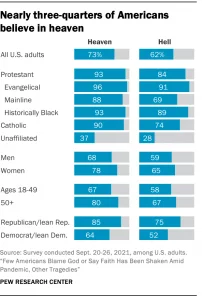 More Americans believe in heaven than believe in hell, which corresponds to the growing influence of a progressive Christian thought that those who do not intentionally reject God will go to an eternal awareness known as heaven while those who intentionally reject God will simply be no more after death. This belief, known as the annihilation theory, is one of several Christian viewpoints on the afterlife.
More Americans believe in heaven than believe in hell, which corresponds to the growing influence of a progressive Christian thought that those who do not intentionally reject God will go to an eternal awareness known as heaven while those who intentionally reject God will simply be no more after death. This belief, known as the annihilation theory, is one of several Christian viewpoints on the afterlife.
While conservative evangelicals are more likely to be taught a view of hell known as eternal conscience torment, other views on eternity include the possibility of some kind of intermediate point (for example, the Catholic teaching of purgatory) where non-believers or sinners are given additional time to purify themselves or to confess belief.
Thus, evangelicals top the charts on belief in a literal hell, Pew found, with 91% affirming this idea. Nationwide, only 62% of Americans believe in a literal hell. Pew also found that Black Christians and Republicans are among the most likely to believe in hell.
Mainline Protestants (69%) are the least likely among Christian groups to believe in hell. Also of note: Women (65%) are slightly more likely than men (59%) to believe in hell.
Pew found even 26% of agnostics say they believe in heaven and 14% believe in hell.
Among those who claim to be “nothing in particular” — the much-heralded “nones” — fully half (50%) believe in heaven and more than a third (39%) believe in hell.
Among those who claim to be “nothing in particular” — the much-heralded “nones” — fully half (50%) believe in heaven and more than a third (39%) believe in hell.
Digging deeper into the data, Pew reported that 26% of U.S. adults believe in neither heaven nor hell. Among that group, however, only two-thirds do not believe in any kind of afterlife. Pew found a small slice of Americans (7%) who believe in an afterlife but do not believe in heaven or hell. That group includes beliefs in an eternal spirit or energy or reincarnation.
Who gets to go to heaven?
If there is a bread-and-butter issue for Christianity, it is how to get to heaven. Different sects of Christianity teach everything from good works to right belief as the key to the pearly gates. And a central teaching of evangelicalism and Catholicism alike is selectiveness of passage to heaven.
Surprisingly, then, more than a third (39%) of Americans are sure that those who do not believe in God can go to heaven. Combined with the 27% who said they don’t believe in heaven, that leaves only 32% of Americans saying that those who do not believe in God cannot go to heaven. (Another 2% didn’t answer the question.)
Not surprisingly, evangelicals (71%) lead the pack in insistence that those who do not believe in God cannot go to heaven. Yet that leaves one-fifth (21%) of evangelicals saying those who don’t believe in God can indeed get to heaven — a belief in direct opposition to a central tenet of evangelical doctrine.
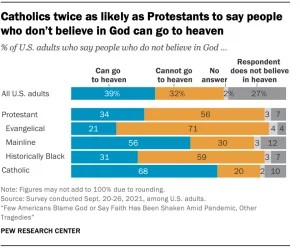 Among American Christians, Catholics (68%) are the most likely to say those who do not believe in God may be admitted to heaven while only 20% of Catholics say the unbelieving cannot get to heaven.
Among American Christians, Catholics (68%) are the most likely to say those who do not believe in God may be admitted to heaven while only 20% of Catholics say the unbelieving cannot get to heaven.
A separate question asked respondents about which religions they believe can lead someone to heaven. Most versions of Christianity distinctly teach that faith in Jesus Christ is the sole path to heaven.
Based on Pew’s findings, that central teaching may be in peril these days, with 58% of all Americans believing “many religions can lead to eternal life in heaven.”
More surprising, however, is that 44% of evangelical Christians believe other religions can lead to heaven and only 19% believe only Christian religions lead to heaven — again in direct opposition to a key doctrine of the churches they attend.
Among all U.S. Christians, Catholics (72%) and mainline Protestants (67%) are the most likely to say “many religions” may lead to heaven.
Evangelicals are by far the most likely (50%) to say their religion “is the one true faith leading to eternal life in heaven.” That is more than double the percentage of mainline Protestants and triple the percentage of Catholics who say the same.
Related articles:
What if God is bigger than ‘omnipotent’? | Opinion by Russ Dean
We must learn from our suffering and help others with what we’ve learned | Opinion by Victoria Adams

